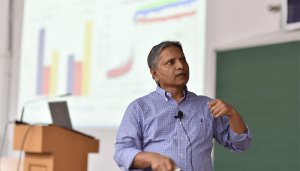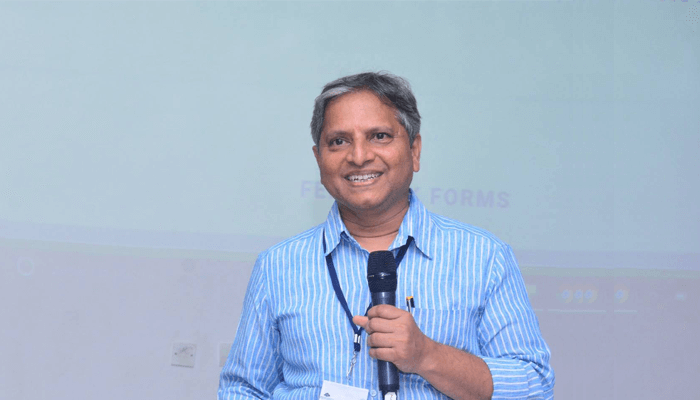This month’s ‘Know Your Professor’ column sees us in conversation with Prof. Bapi Raju from the Cognitive Science lab. He talks of his incidental foray into Computational Neuroscience and Neuroimaging while giving a sneak peek into his current research areas. Read On.
Is he a Neuroscientist? A Psychologist? A Mathematician? Or an AI expert? Prof. Bapi Raju Surampudi is all of the above and some more. This professor-researcher had the philosopher in him awakened with the first assignment he received in the Introduction to AI course while at grad school (University of Texas at Arlington, US). “We were asked to ‘Define Intelligence’ and I was stuck! It is really a question that is still unresolved. I don’t think I have a definitive answer for that yet,” he muses. To understand how the brain supports intelligence and consciousness, he embarked upon a bi-directional journey into Cognitive Science and Artificial Intelligence (AI). “I’m very much interested to know how intelligence is endowed to matter which is the concern of AI and how matter becomes intelligent which is the concern of Cognitive Science,” explains Prof. Raju.
Intelligent Matter
While emerging tech today recognises the importance of interdisciplinary perspectives, it was rather novel in the ‘90s. With a BE in Electrical Engineering, Prof. Raju began his career as a design engineer in a “typical Engineering job” at BHEL in Bhopal and later at Jhansi. It was a desire to combine his love for engineering with an ability to create cutting-edge medical products that led him to the US in pursuit of a Masters in Biomedical Engineering. “The turning point was meeting my advisor who was not a biomedical engineer but a mathematician working on (computational) modelling of the brain,” he says. The young researcher with his moorings in the Computer Science department then signed up for an interdisciplinary research program that enabled him to take courses in medical school – Neuroscience, Physiology, Anatomy and Psychology – along with those in Math and AI. After two postdocs in the fields of AI and Cognitive Science, one each in the UK and Japan respectively, Prof. Raju headed back home to Hyderabad where he joined the University of Hyderabad (UoH) as faculty. “I love teaching, and research and wanted to contribute to this domain. Plus, I have always felt more at home here in India,” he states.
As faculty in the Computer Science department in UoH, he was part of the group instrumental in setting up the Centre for Neural and Cognitive Sciences. “What started as an informal group of us from various departments converging to share ideas eventually led to a separate centre,” he says. Prof. Raju is an esteemed member of the Cognitive Science Association of India and has also served as its Secretary for a few terms. Even while at UoH, the professor was visiting faculty at the International Institute of Information Technology, Hyderabad during 2014-2017. After a 20-year-long stint at UoH, in 2019 he moved to IIITH as full-time faculty in the Cognitive Science Lab. Explaining the move, he talks about Cognitive Science which as a discipline requires the interaction of various other domains as well: “I felt that IIITH has a better overall culture in not having walls or rigid boundaries between disciplines. You can actually work on a thesis that has a Cognitive Science emphasis but is an MS in Computer Science. These kinds of things are less easy in other institutional settings.”
Areas of Research
When Prof. Raju first moved back to India, armed with the training he had acquired in neuroimaging, he set out to analyze functional MRI brain scans to investigate skill or motor learning among people. “Motor skill learning has been of interest to me for long. These skills are special because as memory they take a while to get established but are very robust. For instance, even after a gap of several years, if you get on a bicycle, within a few minutes it all comes back! The question we tried to answer was how are these (skill) memories deposited separately from semantic memories that are prone to forgetfulness,” he says. In his experimental studies, the analysis of brain images showed how the frontal brain area that is involved in higher order cognition is active in the initial stages of learning. As skill gets learned and becomes more automatic, the activity in that part reduces and shifts posteriorly.
Another study that is currently underway is on the brain’s perception of time. “This is again a well-experienced phenomenon. If you are happy, time seems to fly and if you are a bit weighed down, time seems to drag on. We’re looking at this in an experimental setting,” explains Prof. Raju.
Research Collaborations
There are some research initiatives that are being undertaken jointly with other faculty members at IIITH. One such is with Prof. Avinash Sharma of the Centre for Visual Information Technology (CVIT) where a machine learning (ML) model has helped in creating a brain structure-function mapping. The ML model can be used in case of diseases to reveal how functional networks in the brain are compromised due to structural deficits. In another related joint work with Prof. Vinod P.K. from the Centre for Computational Natural Sciences and Bioinformatics (CCNSB), he is looking at the mapping in the whole spectrum of the developing brain all the way to the ageing brain. Similarly with Dr. Naresh Manwani from the Machine Learning lab, Prof. Raju is investigating the phenomenon of ‘brain decoding’. This is a sort of mind-reading technology where an attempt is made to decode what the human brain is seeing by using AI to interpret fMRI scans from people watching videos or viewing images. According to the professor, this is an area that can not only lead to new insights into brain function but is also important for developing brain-computer interfaces eventually.
Other joint efforts involving researchers and clinicians from across the country include generative mathematical models of the brain with a researcher in Biotechnology from IIT Madras and one from the National Brain Research Centre, Manesar. “With computational versions of the brain, it is possible to conduct various experiments such as removing a connection, or introducing a lesion and seeing what happens to the overall functional organisation of the system,” says Prof. Raju.

He is also part of a multi-institute stroke rehabilitation project that sees the participation of IIITH, IIT Madras, Sree Chitra Tirunal Institute for Medical Sciences and Technology, Thiruvananthapuram and NIMHANS, Bangalore. “While NIMHANS and Sree Chitra are the clinical counterparts, we (IIITH) are studying the functional images of the brain and IIT Madras is developing VR games to make the rehabilitation process interesting for patients,” explains Prof. Raju. Similarly, the professor is collaborating with Apollo Hospitals, Kolkata in a longitudinal study of meditation as a therapeutic protocol in the treatment of dementia. “We are analyzing neuroimaging brain data of the patients to see if there are any beneficial changes due to meditation. Though the study is in initial stages and progress was considerably slow thanks to Covid-19, current results seem to be promising for using meditation as an intervention in delaying the rapid progress of the disease,” he says.
On Improving Diversity
The soft-spoken professor has been part of the diversity campaign championing the cause of correcting the skewed gender ratio on campus. Something he attributes to being the lone big brother in a family of 4 younger sisters. This natural empathy saw him as an active member of the Diversity Committee that was expressly set up to increase the intake of girls through the JEE mode of admissions. “I’m quite pleased with the final outcome and hope the momentum is maintained in the coming years,” he says. Terming BTech as the “formative years” of an Engineering education, he says, “It’s rather difficult to enforce a ratio of sorts at the MS or PhD level where it’s more a matter of personal choice to opt for a higher education or not.”
Leisure And Others
With spouse Kiranmayi who is Consultant Psychologist for the institute, it is not uncommon to find riveting conversations about Psychology, the brain, consciousness and the mind at their dinner table. Apart from these common interests, they both share a love for yoga and meditation. What perhaps is little known is the professor’s ear for languages, whether it was picking up the mandatory Hindi and English whilst in school, German during his BTech, Japanese while pursuing his Postdoc and Urdu shayari (poetry) by virtue of being placed in Hyderabad. As someone who studied in the Telugu medium of instruction until 12th grade, all this talk on language fluency brings him to a grievance close to his heart – that of undermining the primary education in one’s native tongue. “We are being increasingly pushed now to think that all education should be in English medium. There are many studies in Cognition that show it is beneficial for a child to undergo formative education in the native tongue,” says Prof. Raju.
For the multidisciplinary professor, effective communication relies on surmounting language barriers. More specifically in his case, it refers to discipline-specific terminology that needs to be overcome. “I’ve had the good fortune of collaborating with a lot of people from different disciplines, such as an array of medical professionals, linguists, psychologists and others. It’s challenging because it’s necessary to develop a common understanding of terms in order to be able to converse,” says Prof. Raju, adding that an interdisciplinary ‘conversation’ may be mandated as a prerequisite to graduate in the near future. “Because that’s where a lot of interesting things are going to happen – at the boundaries of disciplines”.

Sarita Chebbi is a compulsive early riser. Devourer of all news. Kettlebell enthusiast. Nit-picker of the written word especially when it’s not her own.


I am immensely happy and really proud to claim that Prof Surampudi Bapiraju is my nephew! Right from his childhood he has been a very soft spoken and down to earth boy with subtle sense of humor, always fully focussed on his academic excellence but eloquently silent on his proud achievements thru his association with other great intellectuals! May God bless him with all success in his future endeavors to delve deep in to the new dimensions, hitherto unknown of human intelligence!!!??
GADE SUBRAHMANYAM says:Feel proud to proclaim that I am his maternal uncle. Knowing him from early childhood, as I do, it is amazing that he, in his academic pursuit forays into totally unconnected subjects and yet use his innovative skills to collate and arrive at incredibly great results. No wonder therefore, he is a professor of immense knowledge on a variety of subjects and ever eager to inquire into the most complicated, that is the human Brain, a mystery to many scientists of highest order who are continuously engaged to unravel the actual truth behind Brain/Mind. Einstein felt, that one needs to go deep into Hindu Upanishads to know the truth in and beyond physicality. I wish Prof.Raju tries his hand at Sanskrit and Upanishads to sharpen his skills.
G K VISWANATHAM says:Prof Bapi Raju’s interests and works will be a window to the human mind and will reveal the intelligence encoded in the neural circuits. My research interests deeply resonate with Prof. Bapi Raju’s interests. I am happy to know that Prof. Bapi Raju is among the very few professors working in this direction in India.
Deepak Raya says:If there is a chance, I am excited and motivated to work under him, I am currently a masters student in Signal Processing at Indian Institute of Space Science and Technology, Thiruvananthapuram.